Key takeaways:
- Medical decision support systems enhance patient care by providing actionable recommendations based on vast data analysis.
- Community involvement is crucial for developing relevant healthcare tools, fostering trust and inclusivity in medical decisions.
- Evidence-based practices improve healthcare outcomes and encourage collaboration among healthcare professionals.
- Celebrating community achievements through recognition events and shared success stories strengthens community bonds and inspires further participation.
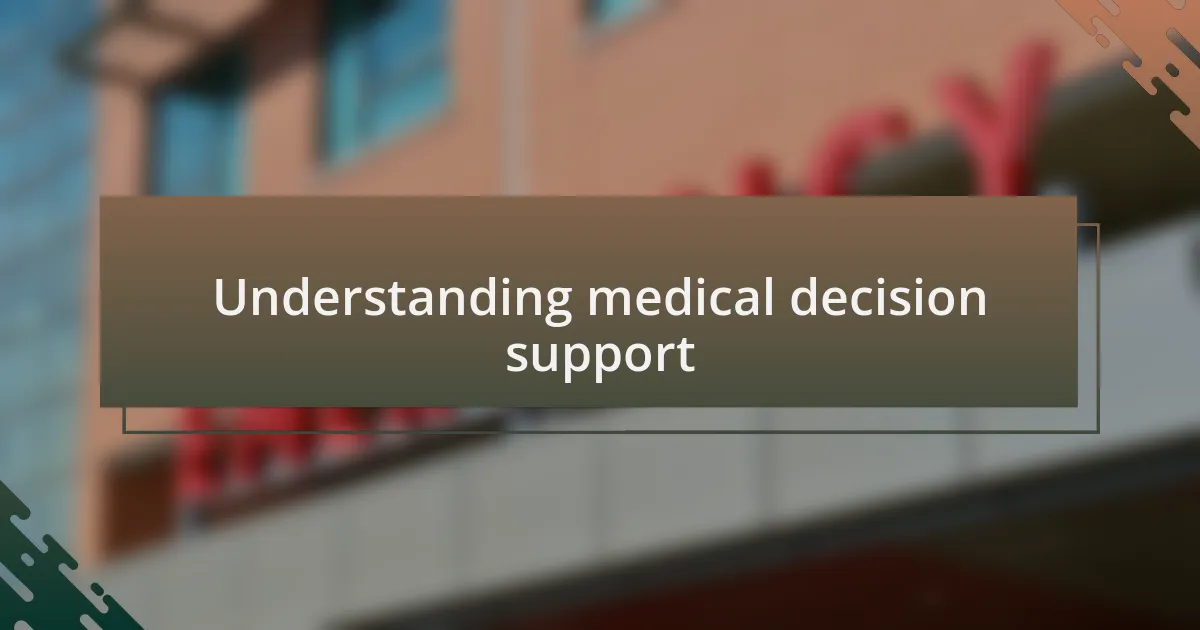
Understanding medical decision support
Medical decision support is an essential tool that guides healthcare providers in making informed decisions, ultimately enhancing patient care. I remember a situation when a colleague faced a complex case, and the decision support system provided critical insights that led to a timely diagnosis. Have you ever felt overwhelmed by medical choices, wondering what path to take? That’s where these systems shine – they distill vast amounts of data into actionable recommendations.
Consider this: a clinician might be presented with countless treatment options for a patient with diabetes. In such moments, the pressure can be immense. This is where medical decision support algorithms come into play, analyzing patient data and best practices to suggest the most effective course of action. I’ve seen firsthand how these systems can reduce uncertainty, nurturing confidence in clinical decisions.
Moreover, it’s fascinating how medical decision support systems evolve continuously, incorporating new research findings and clinical guidelines. Just the other day, I explored an updated platform that utilized real-time data to adjust treatment plans dynamically. Isn’t it exciting to think about how innovation shapes the future of healthcare and empowers professionals to provide the best care possible?

Importance of community involvement
Community involvement plays a pivotal role in enhancing medical decision support initiatives. When I think about the times I’ve collaborated with local health organizations, I see how collective efforts lead to better health outcomes. It’s not just about individual practitioners; it’s about shaping a healthier community through shared knowledge and resources.
Engaging community members fosters trust and encourages participation in health-related programs. I remember attending a community health fair where individuals openly shared their experiences and needs. That exchange of information directly informed the development of a new decision support tool tailored specifically for local health conditions. Isn’t it inspiring how community input can drive innovation and relevance in healthcare?
Moreover, involving communities ensures that diverse perspectives are considered in healthcare decisions. I have seen firsthand how incorporating the voices of various demographic groups led to more inclusive practice guidelines. This diversity enriches the decision-making process and makes medical support systems more effective for everyone. Why wouldn’t we want to amplify those voices for better outcomes?

Role of evidence-based practices
Evidence-based practices form the backbone of effective medical decision support. I recall a project where we meticulously analyzed patient outcomes to identify what truly worked in our community. The findings were eye-opening; it became clear that relying on data-driven approaches not only improved care but also built my confidence in the interventions we suggested. Can you imagine how empowering it feels to back a decision with solid evidence?
In my experience, the integration of evidence-based practices fosters a culture of continuous improvement in healthcare. I remember leading a workshop with healthcare providers where we discussed the latest research on treatment protocols. The energy in the room was palpable as we examined case studies that directly impacted our patient’s experiences. Isn’t it refreshing to witness knowledge transforming into actual practice?
Moreover, utilizing evidence-based frameworks encourages collaboration among professionals. I saw this vividly during a multidisciplinary meeting focused on mental health. Each discipline brought its research, and the collective dialogue shaped our shared strategies. This collaboration not only enriched our recommendations but also strengthened relationships across the board. How can we overlook the power of shared knowledge in enhancing patient care?
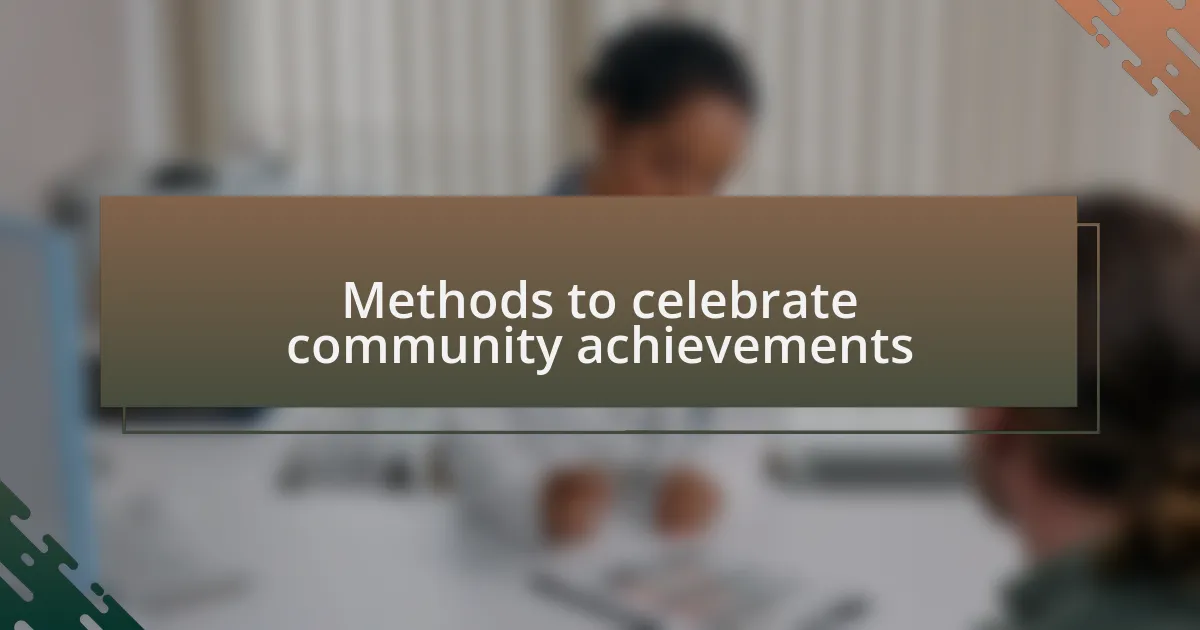
Methods to celebrate community achievements
One effective method to celebrate community achievements is through recognition events. I remember organizing a local health fair where we showcased the milestones of community health initiatives. The pride on the participants’ faces as they shared their stories was palpable. Isn’t it incredible how a simple acknowledgment can boost morale and inspire others to get involved?
Another approach that resonates deeply with me is creating visual displays, such as infographics or digital storytelling. I helped launch a project that highlighted before-and-after statistics of a healthy living campaign. Seeing those numbers transformed into compelling visuals not only educated the community but also fostered a sense of accomplishment within the participants. After all, who doesn’t love seeing tangible results of their hard work?
Sharing success stories through newsletters or social media platforms can amplify community voices. I’ve witnessed firsthand how personal testimonials from community members can resonate, creating a ripple effect of inspiration. Isn’t it amazing how one person’s journey can motivate others to embark on their own path? Celebrating achievements this way not only honors those involved but also invites others to join the movement.
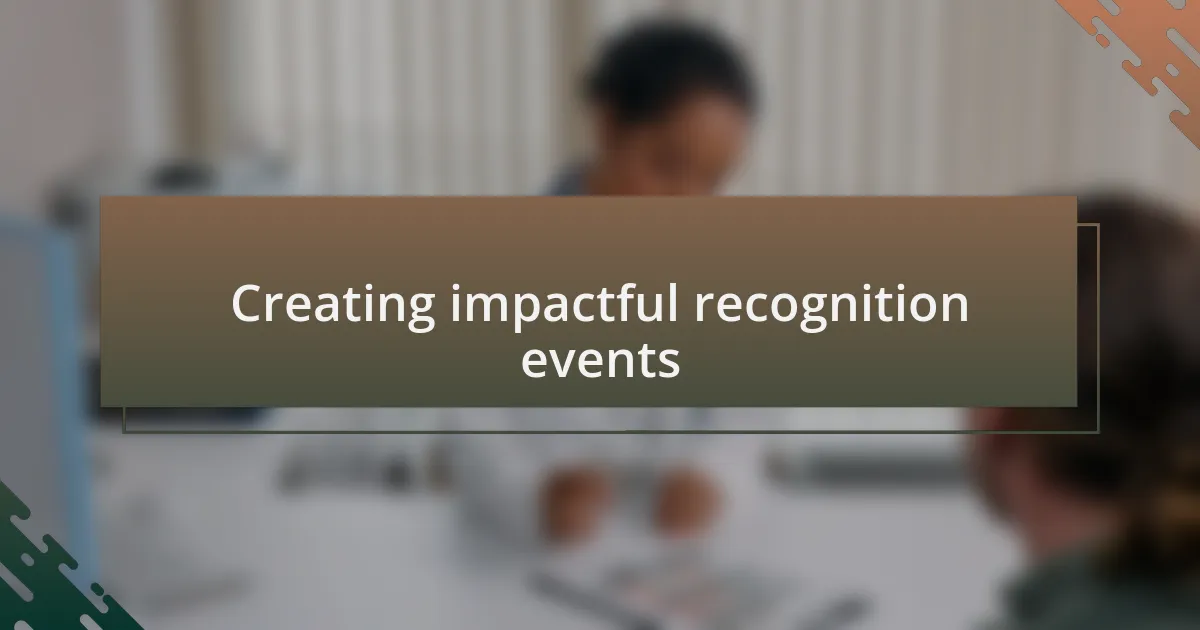
Creating impactful recognition events
Creating impactful recognition events requires careful planning and understanding of the community’s values. I once coordinated a gala to honor healthcare workers during a challenging year. Witnessing colleagues embrace the spotlight, sharing laughter and tears, reminded me how meaningful it is to celebrate their dedication. Have you ever experienced that overwhelming sense of connection among people who share a common purpose?
In my experience, integrating interactive elements can elevate these events significantly. For instance, we introduced a “Wall of Fame” where attendees could pin handwritten notes of gratitude to their favorite health heroes. The energy in that room was electric as people gathered around, reflecting on personal experiences. Wasn’t it lovely to witness community bonds strengthen through shared recognition?
Lastly, I find that timing plays a crucial role in these celebrations. I recall a powerful event held on National Health Day, where we acknowledged local initiatives that made significant impacts. Aligning our recognition with national observances not only amplified our message but also helped us tap into the collective spirit of the moment. How do you think timing can enhance the visibility of community achievements? Celebrating at the right moment can truly resonate, making the impact even more profound.
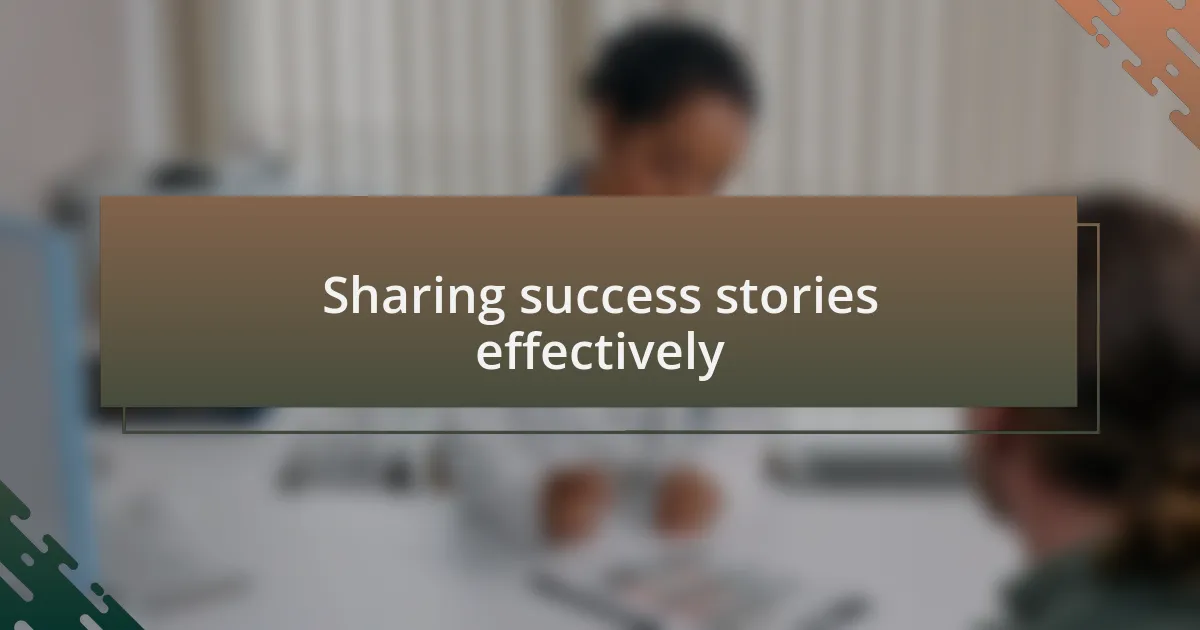
Sharing success stories effectively
Sharing success stories effectively is all about authenticity and connection. During a recent newsletter campaign, I shared a heartfelt account of a community clinic that transformed lives through a new medication management program. The feedback was overwhelming; people were moved by the real change described in the stories. Have you ever felt that ripple of inspiration from a well-told narrative?
Another strategy I’ve found beneficial is utilizing multiple platforms to amplify these stories. For instance, I collaborated with local social media influencers to highlight patient testimonials, creating a buzz that traditional methods wouldn’t have achieved. This cross-platform sharing opened new conversations and encouraged those impacting the community to share their voices. Isn’t it fascinating how different channels can resonate differently?
Lastly, I emphasize the importance of visuals when conveying these success stories. I remember attending an event where impactful before-and-after photos showcased the difference our health programs made. Those images stirred emotions that words alone couldn’t capture. How often do you think about the role visuals play in enhancing a message? By marrying powerful visuals with compelling narratives, we can celebrate achievements in ways that truly engage and inspire.
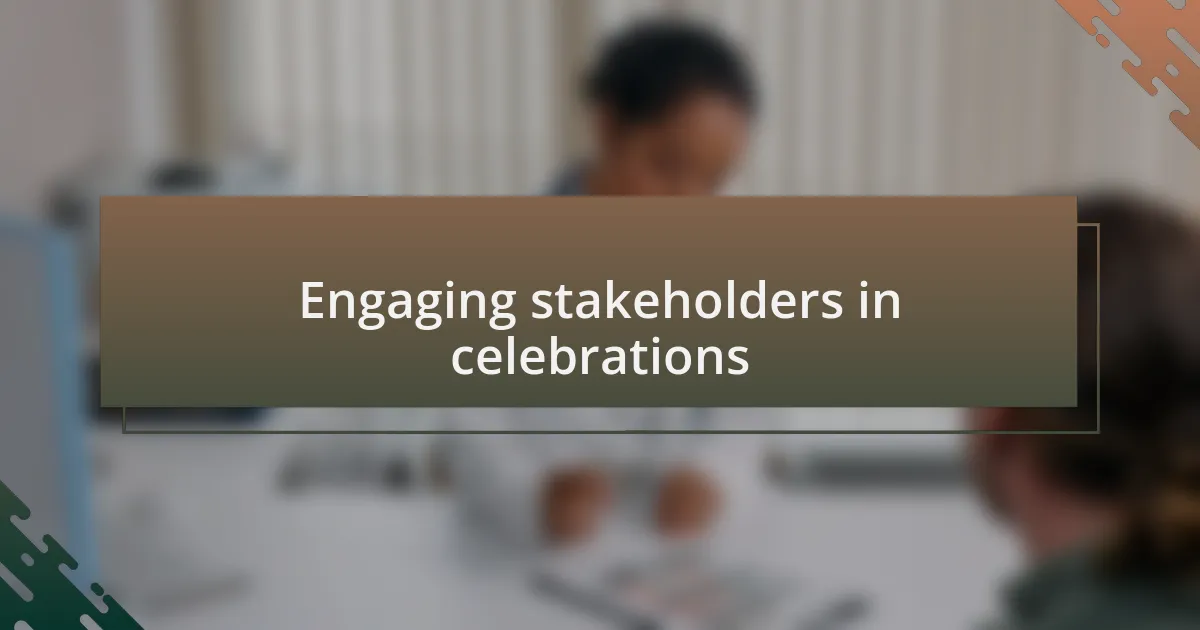
Engaging stakeholders in celebrations
Engaging stakeholders in celebrations requires a thoughtful approach to inclusivity. I’ll never forget organizing a community event to celebrate a major health initiative’s success, where we invited local leaders, healthcare professionals, and even patients who benefited. Seeing the diverse group come together not only strengthened relationships but sparked genuine conversations about future collaborations. Have you considered how involving different voices can amplify the celebration’s impact?
Another approach I cherish is the use of collaborative planning. When I worked alongside community members to design a recognition ceremony, their input made the event feel more personal and meaningful. For instance, we incorporated cultural traditions from various stakeholders, which transformed a standard gathering into a vibrant celebration filled with shared values and stories. Isn’t it amazing how co-creating an experience can deepen connections and reinforce community pride?
Additionally, recognizing stakeholders publicly can have profound effects. I once witnessed a local organization receive an award for their contribution to mental health awareness, and the joy was palpable. The excitement not only motivated them but also inspired other stakeholders to step forward. Such public acknowledgments have a ripple effect that encourages a culture of celebration and recognition. How often do you think we overlook the power of gratitude in our professional interactions?